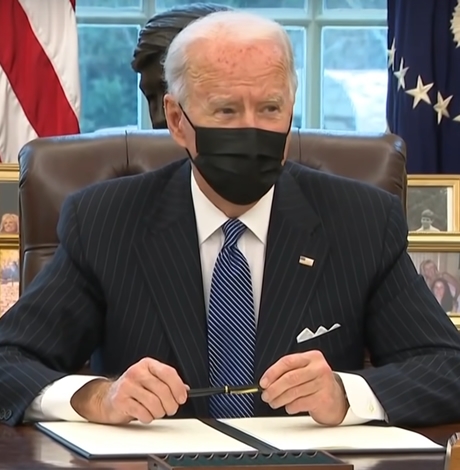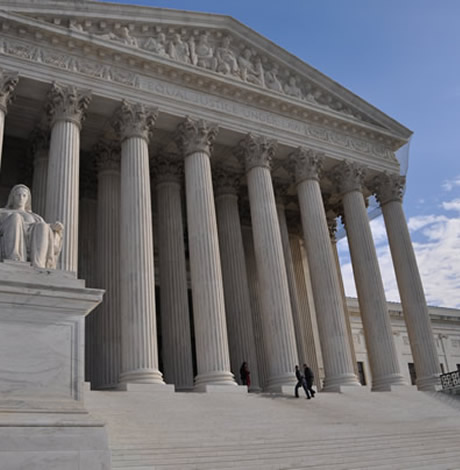National
ExxonMobil to consider barring anti-LGBT job discrimination
Resolution pushed by N.Y. official not likely to succeed: sources

All eyes will be on one of the nation’s largest publicly traded companies next week when shareholders will vote on whether the company should make LGBT protections part of its formal non-discrimination policy.
At a meeting set for May 30 in Dallas, shareholders for the ExxonMobil Corp. will vote on a resolution to include sexual orientation and gender identity in the equal employment opportunity policy for its estimated 82,000 workers — a change the company has resisted.
The resolution is being put before shareholders by New York State Comptroller Thomas DiNapoli. He’s trustee of the New York State Common Retirement Fund, which owns more than 16 million shares of ExxonMobil at an estimated market value of $1.3 billion.
In an interview with the Washington Blade, DiNapoli said he introduced the resolution because of the large investment the New York State Common Retirement Fund has in ExxonMobil. In the past three years, DiNapoli has reached agreements with 27 companies to adopt new non-discrimination policies.
“By ExxonMobil not having a clear policy based on sexual orientation and gender identity, it really leaves the corporation to not getting access to the best talent that’s available,” DiNapoli said. “We’re looking at it very much from the point of view of shareholding and wanting our companies to do very well, and we think that this lack of addressing this issue of discrimination is an impediment to ExxonMobil getting the best performance that will benefit our shares.”
ExxonMobil hasn’t included protections for LGBT workers in its equal employment opportunity policy — nor has it offered domestic partnership benefits for employees with same-sex partners — since the company was created as a result of the merger between Exxon and Mobil in 1999.
Mobil protected employees on the basis of sexual orientation and offered domestic partner benefits prior to the merger, but Exxon didn’t. Once the companies joined, the sexual orientation protections were rescinded and new employees were barred from receiving domestic partner benefits.
A vote on reinstating domestic partner benefits within the company won’t take place on May 30 because no such resolution has been proposed.
LGBT advocates are pushing for ExxonMobil shareholders to adopt a more LGBT-friendly policy at the shareholders meeting next week.
Tico Almeida, president of Freedom to Work, called on all private companies like ExxonMobil to adopt LGBT-inclusive non-discrimination policies because they’re “morally right and good for business.”
“Non-discrimination policies improve worker productivity, worker retention, worker recruitment and increase profits — and that’s why a vast majority of Fortune 500 companies have adopted LGBT non-discrimination rules, and that’s why it’s so jarring that ExxonMobil continues to be such an outlier with such outdated policies,” Almeida said.
Almeida discounted the importance of having a shareholder vote on whether to adopt the policy and said the board should skip the vote and on its own accord make LGBT protections part of the company’s equal employment opportunity policy.
One of the chief advocates of an executive order barring federal contractors from discriminating against LGBT workers, Almeida said the situation with ExxonMobil also speaks to the need for the Obama administration to pursue administrative action against workplace discrimination. The White House announced last month it wouldn’t at this time take such action.
“As taxpayers, we have a right to demand that companies that profit from our taxpayer money do not discriminate against LGBT Americans,” Almeida said. “It is our money as American citizens, and we should exercise that right because LGBT discrimination is not only morally wrong, it’s inefficient.”
According to Freedom to Work, ExxonMobil has raked in more than $1 billion in federal contracts over the course of the last decade. In the last fiscal year, ExxonMobil won $158 million in federal contracts.
But Almeida is taking the matter a step further and saying the White House should call on ExxonMobil to adopt the LGBT protections as part of its policy. Almeida said he’s had conversations with White House staff on this matter.
As evidence that the administration has promised to educate companies on the need for non-discrimination protections, Almeida pointed to a news conference on the day after the White House announced it wouldn’t issue the executive order for federal contractors.
During the briefing, White House press secretary Jay Carney said the administration was committed to “directly engaging with and educating all sectors of the business community — from major corporations to contractors to small business — and raising public awareness about the human and financial costs of discrimination in the work force.”
Almeida said, “We are urging them to take a strong stand in the next week or two to push ExxonMobil to accept the New York State shareholder resolution, which is a promise that Jay Carney made at that press briefing.”
The White House didn’t respond to a request for comment on the call for ExxonMobil to add non-discrimination protections as part of its policy.
Additionally, Freedom to Work set up an online petition at Change.org to encourage ExxonMobil to update its policy. As of early Tuesday, the petition had 200 signatures.
“The corporation ExxonMobil takes millions of dollars in American taxpayers’ hard-earned dollars every year through federal contracts, but Exxon’s corporate bosses refuse to follow American values – like judging their employees based on their talent and hard work rather than whom they love,” the petition letter states.
Cece Cox, CEO of Resource Center Dallas, a local LGBT and HIV/AIDS organization, said she wants to see the Dallas-based company change its policy because the company operates in close proximity of her organization.
“It’s the only remaining Fortune 10 company that doesn’t have an inclusive policy of sexual orientation, and they’re right here in our backyard,” Cox said. “As our neighbors, we would like to encourage and be in conversation with ExxonMobil about this issue.”
Cox said the Resource Center has contacted ExxonMobil’s vice president of human resources, M.A. Farrant, to encourage the company to adopt an LGBT-inclusive policy and sent a letter to Marilyn Carlson Nelson, an ExxonMobil board member and CEO of Carlson Companies whom they think may be amendable to the resolution because she wrote an op-ed against the proposed anti-gay amendment in Minnesota.
The company has sought to block the vote on adopting an LGBT-inclusive non-discrimination policy from taking place. The company’s board had asked the Securities & Exchange Commission to block the resolution from coming before shareholders, but the agency rejected the request in March.
According to ExxonMobil, the company already has protections for LGBT workers. An ExxonMobil spokesperson referred to protections based on sexual orientation and gender identity that are already included in the employment policies and practices page on the company’s website, which specifically states the company has a “zero-tolerance policy” for discrimination based on sexual orientation or gender identity.
A letter dated Jan. 20, 2012 from James Parsons, ExxonMobil’s coordinator for corporate securities and finance, suggests this policy statement is sufficient protection for LGBT employees.
“To be clear, in my opinion the statement of our employment policy specifically referencing sexual orientation and gender identity set forth on ExxonMobil’s internet employment policy page gives employees and potential employees precisely the same legal standing and access to rights and remedies — including the internal enforcement remedies available for violations of ExxonMobil policy, up to and including termination of the offending employee — as would be the case if these categories were instead referenced in the Standards of Business Conduct booklet,” Parsons writes.
In response, DiNapoli said this policy isn’t enough and noted the Securities & Exchange Commission denied that inclusion of sexual orientation and gender identity in this policy was a reason to block the resolution.
“We really think that they should have it stated in their policies, not just something on the website,” DiNapoli said. “[The EEO policy] is part of their written policies and procedures that follow from it. Obviously, the SEC made a resolution that our determination could go ahead because they basically found that what we were suggesting wasn’t in effect at ExxonMobil. So, I think that they are not accurate in what they’re portraying.”
ExxonMobil, the largest company in the world in terms of revenue, is known for having anti-gay policies. The most recent Corporate Equality Index from the Human Rights Campaign scored the company at “-25” — the lowest rating of any company.
LGBT advocates speaking with the Washington Blade couldn’t identify any incidents of LGBT job discrimination at ExxonMobil, but nonetheless said a change in company policy is necessary.
Paul Guequierre, an HRC spokesperson, emphasized the importance of ExxonMobil adopting an LGBT-inclusive equal employment opportunity policy as a way to make it more competitive with other companies.
“It’s important that non-discrimination policies include sexual orientation and gender identity,” Guequierre said. “We know the vast majority of Fortune 500 companies — including ExxonMobil’s competitors in the oil industry — offer these protections.”
Crosby Burns, research associate on LGBT issues at the Center for American Progress, said the adoption of an LGBT-inclusive policy is particularly important for ExxonMobil because the company is based in Texas, which has no statutory protections against LGBT job bias.
“ExxonMobil is one of the largest employers in Texas, and adding sexual orientation and gender identity to its EEO policy would give LGBT workers significant employment protections in a state where there sadly are none,” Burns said.
The upcoming meeting won’t be the first time ExxonMobil shareholders have had to vote on adopting an LGBT-inclusive non-discrimination policy. The New York State Common Retirement Fund has been the sponsor of similar resolutions each year since 2008.
According to ExxonMobil, votes cast in favor of the proposal have declined in recent years, from a high of 39.6 percent in 2008 to 19.9 percent at last year’s annual meeting. Still, the 2011 vote represented more than 500 million shares at a market value of more than $42.4 billion.
While emphasizing the need for ExxonMobil to adopt the policy, advocates weren’t confident about whether shareholders would ultimately vote to approve the LGBT non-discrimination resolution next week.
DiNapoli said “we’re always optimistic” that shareholders will adopt the new policy as opposed to rejecting it and the chances are better that they’ll support it this year.
“As a nation generally, and certainly in terms of shareholders being informed about what’s going on, the prospects are better than they were in other years, but obviously, we’ll have to wait and see what the vote is,” DiNapoli said. “I’m certainly confident at some point we’re going to have success in regard to ExxonMobil’s policies; I’m hoping it will be this year.”
The Resource Center’s Cox said she doesn’t think shareholders will approve the resolution — just as they’ve rejected it in years past — but said she isn’t normally in the business of predicting.
“I don’t have reason to think that it’s going to get approved,” Cox said. “I’d be surprised if it does this year, but I think there’s opportunity to work with Exxon leadership, and that’s what we’re trying to do.”
Almeida said he thinks the shareholder resolution will face a close vote, but added if it fails, the outcome will be another reason for Obama to issue an executive order barring workplace discrimination for federal contractors.
“That will increase the need for President Obama to fulfill his campaign promise of signing the executive order for federal contractors because there’s no way ExxonMobil would risk losing lucrative federal contracts in order to keep its antiquated anti-LGBT policies,” Almeida said. “If the president signs the executive order, they will immediately cave.”
Pennsylvania
Malcolm Kenyatta could become the first LGBTQ statewide elected official in Pa.
State lawmaker a prominent Biden-Harris 2024 reelection campaign surrogate

Following his win in the Democratic primary contest on Wednesday, Pennsylvania state Rep. Malcolm Kenyatta, who is running for auditor general, is positioned to potentially become the first openly LGBTQ elected official serving the commonwealth.
In a statement celebrating his victory, LGBTQ+ Victory Fund President Annise Parker said, “Pennsylvanians trust Malcolm Kenyatta to be their watchdog as auditor general because that’s exactly what he’s been as a legislator.”
“LGBTQ+ Victory Fund is all in for Malcolm, because we know he has the experience to win this race and carry on his fight for students, seniors and workers as Pennsylvania’s auditor general,” she said.
Parker added, “LGBTQ+ Americans are severely underrepresented in public office and the numbers are even worse for Black LGBTQ+ representation. I look forward to doing everything I can to mobilize LGBTQ+ Pennsylvanians and our allies to get out and vote for Malcolm this November so we can make history.”
In April 2023, Kenyatta was appointed by the White House to serve as director of the Presidential Advisory Commission on Advancing Educational Equity, Excellence and Economic Opportunity for Black Americans.
He has been an active surrogate in the Biden-Harris 2024 reelection campaign.
The White House
White House debuts action plan targeting pollutants in drinking water
Same-sex couples face higher risk from environmental hazards

Headlining an Earth Day event in Northern Virginia’s Prince William Forest on Monday, President Joe Biden announced the disbursement of $7 billion in new grants for solar projects and warned of his Republican opponent’s plans to roll back the progress his administration has made toward addressing the harms of climate change.
The administration has led more than 500 programs geared toward communities most impacted by health and safety hazards like pollution and extreme weather events.
In a statement to the Washington Blade on Wednesday, Brenda Mallory, chair of the White House Council on Environmental Quality, said, “President Biden is leading the most ambitious climate, conservation, and environmental justice agenda in history — and that means working toward a future where all people can breathe clean air, drink clean water, and live in a healthy community.”
“This Earth Week, the Biden-Harris Administration announced $7 billion in solar energy projects for over 900,000 households in disadvantaged communities while creating hundreds of thousands of clean energy jobs, which are being made more accessible by the American Climate Corps,” she said. “President Biden is delivering on his promise to help protect all communities from the impacts of climate change — including the LGBTQI+ community — and that we leave no community behind as we build an equitable and inclusive clean energy economy for all.”
Recent milestones in the administration’s climate policies include the U.S. Environmental Protection Agency’s issuance on April 10 of legally enforceable standard for detecting and treating drinking water contaminated with polyfluoroalkyl substances.
“This rule sets health safeguards and will require public water systems to monitor and reduce the levels of PFAS in our nation’s drinking water, and notify the public of any exceedances of those levels,” according to a White House fact sheet. “The rule sets drinking water limits for five individual PFAS, including the most frequently found PFOA and PFOS.”
The move is expected to protect 100 million Americans from exposure to the “forever chemicals,” which have been linked to severe health problems including cancers, liver and heart damage, and developmental impacts in children.
An interactive dashboard from the United States Geological Survey shows the concentrations of polyfluoroalkyl substances in tapwater are highest in urban areas with dense populations, including cities like New York and Los Angeles.
During Biden’s tenure, the federal government has launched more than 500 programs that are geared toward investing in the communities most impacted by climate change, whether the harms may arise from chemical pollutants, extreme weather events, or other causes.
New research by the Williams Institute at the UCLA School of Law found that because LGBTQ Americans are likelier to live in coastal areas and densely populated cities, households with same-sex couples are likelier to experience the adverse effects of climate change.
The report notes that previous research, including a study that used “national Census data on same-sex households by census tract combined with data on hazardous air pollutants (HAPs) from the National Air Toxics Assessment” to model “the relationship between same-sex households and risk of cancer and respiratory illness” found “that higher prevalence of same-sex households is associated with higher risks for these diseases.”
“Climate change action plans at federal, state, and local levels, including disaster preparedness, response, and recovery plans, must be inclusive and address the specific needs and vulnerabilities facing LGBT people,” the Williams Institute wrote.
With respect to polyfluoroalkyl substances, the EPA’s adoption of new standards follows other federal actions undertaken during the Biden-Harris administration to protect firefighters and healthcare workers, test for and clean up pollution, and phase out or reduce use of the chemicals in fire suppressants, food packaging, and federal procurement.
Maine
Maine governor signs transgender, abortion sanctuary bill into law
Bomb threats made against lawmakers before measure’s passage

BY ERIN REED | On Tuesday, Maine Gov. Janet Mills signed LD 227, a sanctuary bill that protects transgender and abortion providers and patients from out-of-state prosecution, into law.
With this action, Maine becomes the 16th state to explicitly protect trans and abortion care in state law from prosecution. This follows several bomb threats targeting state legislators after social media attacks from far-right anti-trans influencers such as Riley Gaines and Chaya Raichik of Libs of TikTok.
An earlier version of the bill failed in committee after similar attacks in January. Undeterred, Democrats reconvened and added additional protections to the bill before it was passed into law.
The law is extensive. It asserts that gender-affirming care and reproductive health care are “legal rights” in Maine. It states that criminal and civil actions against providers and patients are not enforceable if the provision or access to that care occurred within Maine’s borders, asserting jurisdiction over those matters.
It bars cooperation with out-of-state subpoenas and arrest warrants for gender-affirming care and abortion that happen within the state. It even protects doctors who provide gender-affirming care and abortion from certain adverse actions by medical boards, malpractice insurance, and other regulating entities, shielding those providers from attempts to economically harm them through out-of-state legislation designed to dissuade them from providing care.
You can see the findings section of the bill here:
The bill also explicitly enshrines the World Professional Association of Transgender Health’s Standards of Care, which have been the target of right-wing disinformation campaigns, into state law for the coverage of trans healthcare:
The bill is said to be necessary due to attempts to prosecute doctors and seek information from patients across state lines. In recent months, attorneys general in other states have attempted to obtain health care data on trans patients who traveled to obtain care. According to the U.S. Senate Finance Committee, attorneys general in Tennessee, Indiana, Missouri, and Texas attempted to obtain detailed medical records “to terrorize transgender teens in their states … opening the door to criminalizing women’s private reproductive health care choices.”
The most blatant of these attempts was from the attorney general of Texas, who, according to the Senate Finance Committee, “sent demands to at least two non-Texas entities.” One of these entities was Seattle Children’s Hospital, which received a letter threatening administrators with arrest unless they sent data on Texas patients traveling to Seattle to obtain gender-affirming care.
Seattle Children’s Hospital settled that case out of court this week, agreeing to withdraw its Texas business registration in return for Texas dropping its investigation. This likely will have no impact on Seattle Children’s Hospital, which has stated it did not treat any youth via telemedicine or in person in Texas; the hospital will be able to continue treating Texas youth who travel outside of Texas to obtain their care. That settlement was likely compelling due to a nearly identical law in Washington that barred out-of-state investigations on trans care obtained solely in the state of Washington.
The bill has faced a rocky road to passage. A similar bill was debated in January, but after coming under intense attack from anti-trans activists who misleadingly called it a “transgender trafficking bill,” the bill was voluntarily withdrawn by its sponsor.
When LD 227 was introduced, it faced even more attacks from Gaines and Libs of TikTok. These attacks were followed by bomb threats that forced the evacuation of the legislature, promising “death to pedophiles” and stating that a bomb would detonate within a few hours in the capitol building.
Despite these threats, legislators strengthened both the abortion and gender-affirming care provisions and pressed forward, passing the bill into law. Provisions found in the new bill include protecting people who “aid and assist” gender-affirming care and abortion, protections against court orders from other states for care obtained in Maine, and even protections against adverse actions by health insurance and malpractice insurance providers, which have been recent targets of out-of-state legislation aimed at financially discouraging doctors from providing gender-affirming care and abortion care even in states where it is legal.
See a few of the extensive health insurance and malpractice provisions here:
Speaking about the bill, Gia Drew, executive director of Equality Maine, said in a statement, “We are thrilled to see LD 227, the shield bill, be signed into law by Gov. Mills. Thanks to our pro equality and pro reproductive choice elected officials who refused to back down in the face of disinformation. This bill couldn’t come into effect at a better time, as more than 40 percent of states across the country have either banned or attempted to block access to reproductive care, which includes abortions, as well as transgender healthcare for minors. Thanks to our coalition partners who worked tirelessly to phone bank, lobby, and get this bill over the finish line to protect community health.”
Destie Hohman Sprague of the Maine Women’s Lobby celebrated the passage of the bill despite threats of violence, saying in a statement, “A gender-just Maine ensures that all Mainers have access to quality health care that supports their mental and physical wellbeing and bodily autonomy, including comprehensive reproductive and gender-affirming care. We celebrate the passage of LD 227, which helps us meet that goal. Still, the patterns of violence and disinformation ahead of the vote reflected the growing connections between misogyny, extremism, and anti-democratic threats and actions. We must continue to advocate for policies that protect bodily autonomy, and push back against extremist rhetoric that threatens our states’ rights and our citizens’ freedoms.”
The decision to pass the legislation comes as the Biden administration released updated HIPAA protections that protect “reproductive health care” from out-of-state prosecutions and investigations.
Although the definition of “reproductive health care” is broad in the new HIPAA regulations, it is uncertain whether they will include gender-affirming care. For at least 16 states, though, gender-affirming care is now explicitly protected by state law and shielded from out-of-state legislation, providing trans people and those seeking abortions with protections as the fight increasingly crosses state lines.
****************************************************************************

Erin Reed is a transgender woman (she/her pronouns) and researcher who tracks anti-LGBTQ+ legislation around the world and helps people become better advocates for their queer family, friends, colleagues, and community. Reed also is a social media consultant and public speaker.
******************************************************************************************
The preceding article was first published at Erin In The Morning and is republished with permission.






















